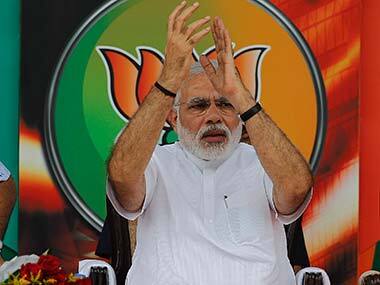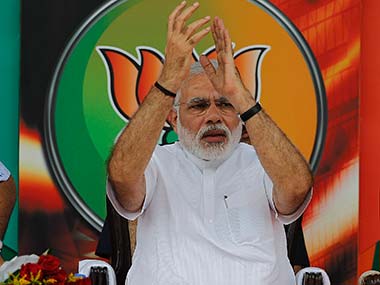With the Congress party’s 0-4 mauling and BJP’s triumph in three states in what was billed as the “semifinal” for the 2014 elections,the Indian markets are on a roll.
The market kicked-off the week on a strong note on Monday with the Nifty hitting a allhigh the open today, touching 6404, up 148 points. The BSESensex opened at 21472, up 470 points.
The Nifty new high comes after 5 years and 11 months.
Foreign brokerages have been gung-ho in the run-up to the Lok Sabha elections. They see such a BJP win improving the prospects of Gujarat Chief Minister Narendra Modi becoming the next prime minister. They think Modi is the only hope for the markets and economy.
[caption id=“attachment_1258947” align=“alignleft” width=“380”]
 Foreign brokerages have been gung-ho in the run-up to the elections. They see such a BJP win improving the prospects of Gujarat Chief Minister Narendra Modi becoming the next prime minister. They think Modi is the only hope for the markets and economy.[/caption]
Foreign brokerages have been gung-ho in the run-up to the elections. They see such a BJP win improving the prospects of Gujarat Chief Minister Narendra Modi becoming the next prime minister. They think Modi is the only hope for the markets and economy.[/caption]
But, there are dissenting voices too. Neelkanth Misra of Credit Suisse has told CNBC TV18 that elections and even QE tapering in the US are not factors that can impact the markets. He says only an improvement in the investment cycle can revive the economy.
Another economist who has doubts about the viability of extrapolating the state election results to the national level is Abheek Barua of HDFC Bank.
In a column in the Business Standard, he has trashed the arguments in favour of Modi. He has raised four pertinent questions that may not go well with Modi supporters. Here they are :
First, can Modi replicate the Gujarat model of development to the rest of the country? Problems in India differ from region to region, state to state. Gujarat has always been a industrialised and business friendly state. It is easy to push through Modi-type development agenda there. But there is no guarantee that it will work elsewhere. Will Modi be able to industrialise the rest of the country with the same zeal? “Will he, for instance, ride roughshod over the new land acquisition norms and provide cheap land for industry?” Barua asks.
Second, if Modi indeed becomes the prime minister, wouldn’t he also be dealing with the same kind of coalition pressures? If the partners are as autocratic as himself, the friction will only increase. Sparks will fly.
Thrid, how much will he able to fix the tottering economy, given Finance Minister P Chidambaram is likely to burden the next government with a high fiscal deficit and the deferred subsidies for oil, fertilisers etc? If Modi wants to fix this, he will have to cut some of the “revenue-guzzling” welfare schemes that the two UPA regimes have introduced. This is highly unlikely. For instance, will Modi have the stomach to stop NREGA or any such schemes? Definitely, the Food Security Act is out of question, because it has been supported by the BJP too.
Last but not the least is impact of the polarising nature of Modi’s policies. He expects these to deeply divide India’s politics. “I suspect the growth (Mr Modi’s credo)-versus-redistribution/development debate will intensify,” says Barua. He sees extreme opposition from the “soft-left” “pro-welfare” lobby against Modi. “…The face-off could get nasty,” he warns.
In short, the market’s enthusiasm over Modi’s ascension to power may well be misplaced. The experiment to find out whether a failing economy can be lifted by a positively decisive leader like Modi is likely to fail, says Barua.
)